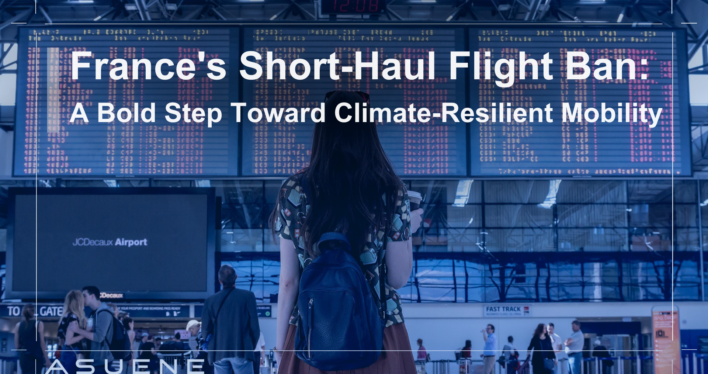- Article Summary
-
Introduction: Reimagining Air Travel for a Low-Carbon Future
In 2021, France introduced a significant climate-conscious transportation policy in June 2023, implementing a ban on certain short-haul domestic flights when a train alternative of 2.5 hours or less exists. This law positions France as a frontrunner in sustainable mobility, targeting a sector that is notoriously hard to decarbonize.
The law aligns with the broader goals of the EU Green Deal and the national ambition to reach carbon neutrality by 2050. While symbolic in scope today, the flight ban signals a willingness to legislate behavioral change to meet climate targets. This article explores the rationale, structure, impact, and future potential of the short-haul flight ban, offering insights into how such policies intersect with corporate ESG strategies and long-term sustainability planning.
Policy Overview: What the 2.5-Hour Train Rule Really Says
France’s short-haul flight ban, introduced in June 2023, is based on Article 145 of the Climate and Resilience Law. The key principle is simple: if a high-speed rail alternative of 2.5 hours or less is available and sufficiently frequent, flights on that route are to be suspended.
Criteria for the Ban:
- The route must be domestic (within metropolitan France).
- A train journey must take 2.5 hours or less each way.
- Trains must allow same-day round trips with adequate time (minimum 8 hours at destination).
- The rail option must operate multiple times per day at suitable hours.
Current Routes Banned (as of 2023):
As of 2023, the ban applies to three specific domestic routes: Paris Orly to Bordeaux, Paris Orly to Nantes, and Paris Orly to Lyon. Each of these routes has a viable high-speed rail alternative provided by the TGV network, meeting the legal criteria for the flight restriction.
CO₂ Emissions Comparison (per passenger per 500 km):
| Mode of Transport | Emissions (kg CO₂) |
|---|---|
| Domestic Flight | 135 |
| High-Speed Train (TGV) | 4 |
| Diesel Car | 80 |
Impacts and Controversies: Symbolic or Systemic?
The measure has sparked debate across industries and the public. Supporters view it as a trailblazing climate action, while critics argue its scope is too narrow.
Environmental Impact:
The affected flights make up only about 2.6 percent of French domestic air traffic, but the law sets a precedent for reducing Scope 3 emissions related to travel. Substituting train travel, which is powered by France’s low-carbon electricity mix, results in dramatic CO₂ savings.
Industry Pushback:
Airlines, including Air France-KLM, initially challenged the measure, concerned about lost revenue and regulatory overreach. However, the European Commission approved the ban in 2023, confirming it complies with EU air transport regulations.
Climate Justice and Accessibility:
Some argue the law favors urban travelers with TGV access while neglecting rural regions. Others raise concerns about the cost of rail travel, which can be higher than low-cost airline tickets.
Criticism from Climate NGOs:
Groups such as Greenpeace and Réseau Action Climat have called the ban symbolic, pointing out that only three routes qualify under current criteria. They advocate for expanding the law to routes up to 4 hours, as infrastructure improves.

Beyond France: Toward a European Green Transport Model
France’s move has captured the attention of neighboring EU countries, many of which are considering similar bans or rail investments.
Parallel Efforts in Europe:
- Austria: Banned short-haul flights where a rail alternative under 3 hours exists (e.g., Vienna–Salzburg).
- Spain: Exploring bans on flights with rail alternatives under 2.5 hours as part of climate law reforms.
- Germany: Investing €45 billion in rail modernization by 2030, although no formal ban yet.
Rail Investment and Integration:
France is investing over €4 billion into expanding and upgrading TGV lines to improve frequency and regional coverage. Future projects like Bordeaux–Toulouse and Marseille–Nice could qualify more routes for a potential extension of the flight ban.
Conclusion: Lessons for Global ESG and Transport Policy
France’s 2.5-hour train rule is more than just a national policy. It is a blueprint for how countries can restructure travel patterns in pursuit of climate goals. While its immediate emissions reductions are modest, the law normalizes low-carbon alternatives and shows how policy can drive behavior change.
For companies focused on ESG, the law underscores the growing importance of sustainable business travel, employee mobility planning, and alignment with Scope 3 emissions targets. It also highlights the need for public-private collaboration in expanding green infrastructure.
As high-speed rail becomes more accessible, and pressure grows to decarbonize transport, France’s leadership offers a practical, scalable model. The future of sustainable mobility may well depend on the ability of nations to take similar bold and smart steps toward climate resilience.
Why Work with ASUENE Inc.?
Asuene is a key player in carbon accounting, offering a comprehensive platform that measures, reduces, and reports emissions, including Scope 1-3. Asuene serves over 10,000 clients worldwide, providing an all-in-one solution that integrates GHG accounting, ESG supply chain management, a Carbon Credit exchange platform, and third-party verification.
ASUENE supports companies in achieving net-zero goals through advanced technology, consulting services, and an extensive network.


